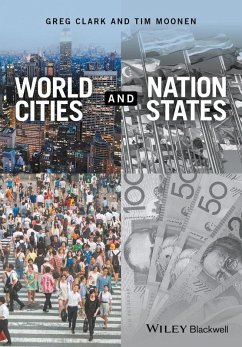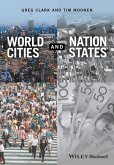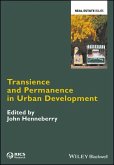51,99 €
51,99 €
inkl. MwSt.
Sofort per Download lieferbar

0 °P sammeln
51,99 €
Als Download kaufen

51,99 €
inkl. MwSt.
Sofort per Download lieferbar

0 °P sammeln
Jetzt verschenken
Alle Infos zum eBook verschenken
51,99 €
inkl. MwSt.
Sofort per Download lieferbar
Alle Infos zum eBook verschenken

0 °P sammeln
- Format: ePub
- Merkliste
- Auf die Merkliste
- Bewerten Bewerten
- Teilen
- Produkt teilen
- Produkterinnerung
- Produkterinnerung

Bitte loggen Sie sich zunächst in Ihr Kundenkonto ein oder registrieren Sie sich bei
bücher.de, um das eBook-Abo tolino select nutzen zu können.
Hier können Sie sich einloggen
Hier können Sie sich einloggen
Sie sind bereits eingeloggt. Klicken Sie auf 2. tolino select Abo, um fortzufahren.

Bitte loggen Sie sich zunächst in Ihr Kundenkonto ein oder registrieren Sie sich bei bücher.de, um das eBook-Abo tolino select nutzen zu können.
World Cities and Nation States takes a global perspective to show how national governments and states/provinces/regions continue to play a decisive, and often positive, partnership role with world cities. The 16 chapter book comprised of two introductory chapters, 12 central chapters that draw on case studies, and two summary chapters - draws on over 40 interviews with national ministers, city government officials, business leaders and expert academics.
- Geräte: eReader
- mit Kopierschutz
- eBook Hilfe
- Größe: 14.35MB
Andere Kunden interessierten sich auch für
![World Cities and Nation States (eBook, PDF) World Cities and Nation States (eBook, PDF)]() Greg ClarkWorld Cities and Nation States (eBook, PDF)51,99 €
Greg ClarkWorld Cities and Nation States (eBook, PDF)51,99 €![The Making of a World City (eBook, ePUB) The Making of a World City (eBook, ePUB)]() Greg ClarkThe Making of a World City (eBook, ePUB)66,99 €
Greg ClarkThe Making of a World City (eBook, ePUB)66,99 €![Transience and Permanence in Urban Development (eBook, ePUB) Transience and Permanence in Urban Development (eBook, ePUB)]() Transience and Permanence in Urban Development (eBook, ePUB)98,99 €
Transience and Permanence in Urban Development (eBook, ePUB)98,99 €![Transforming Private Landlords (eBook, ePUB) Transforming Private Landlords (eBook, ePUB)]() Tony CrookTransforming Private Landlords (eBook, ePUB)95,99 €
Tony CrookTransforming Private Landlords (eBook, ePUB)95,99 €![Social Housing in Europe (eBook, ePUB) Social Housing in Europe (eBook, ePUB)]() Social Housing in Europe (eBook, ePUB)109,99 €
Social Housing in Europe (eBook, ePUB)109,99 €![Das Nordwand-Prinzip (eBook, ePUB) Das Nordwand-Prinzip (eBook, ePUB)]() Rainer PetekDas Nordwand-Prinzip (eBook, ePUB)23,99 €
Rainer PetekDas Nordwand-Prinzip (eBook, ePUB)23,99 €![Mortgages Made Easy (eBook, ePUB) Mortgages Made Easy (eBook, ePUB)]() Bruce BrammallMortgages Made Easy (eBook, ePUB)13,99 €
Bruce BrammallMortgages Made Easy (eBook, ePUB)13,99 €-
-
-
World Cities and Nation States takes a global perspective to show how national governments and states/provinces/regions continue to play a decisive, and often positive, partnership role with world cities. The 16 chapter book comprised of two introductory chapters, 12 central chapters that draw on case studies, and two summary chapters - draws on over 40 interviews with national ministers, city government officials, business leaders and expert academics.
Dieser Download kann aus rechtlichen Gründen nur mit Rechnungsadresse in A, B, BG, CY, CZ, D, DK, EW, E, FIN, F, GR, HR, H, IRL, I, LT, L, LR, M, NL, PL, P, R, S, SLO, SK ausgeliefert werden.
Produktdetails
- Produktdetails
- Verlag: Wiley
- Seitenzahl: 304
- Erscheinungstermin: 10. November 2016
- Englisch
- ISBN-13: 9781119216445
- Artikelnr.: 47348430
- Verlag: Wiley
- Seitenzahl: 304
- Erscheinungstermin: 10. November 2016
- Englisch
- ISBN-13: 9781119216445
- Artikelnr.: 47348430
- Herstellerkennzeichnung Die Herstellerinformationen sind derzeit nicht verfügbar.
Greg Clark is an advisor and mentor for cities, business, and investment. He works with leadership in global cities, global firms, global institutions, and at global gatherings.Greg trained as an Economist, Social and Political Scientist, City & Regional Planner at Cambridge University, UK, Columbia University, NYC, and London School of Economics. Harkness Fellow and author of ten books and numerous reports and papers on cities and business development issues. He has just been awarded the CBE. Tim Moonen is a researcher on the future of cities and globalisation, and currently the Director of Research at The Business of Cities. He has written extensively about global urban financing, long-term strategic planning, and comparative city competitiveness. He has recently authored and co-authored original work on international development bank investment for cities, the future of European cities, and the concept of global fluency as a tool for city and metropolitan leaders.
Foreword xii
Preface xiv
Section I Introducing world cities and nation states 1
1 Introduction: Clash of the centuries? 3
Urbanisation and globalisation: The age of world cities 5
The future imperatives for world cities 6
Nation states in the urban age 6
Different models and starting points 9
Other inherited factors 11
Overview of the book 14
2 Cities and nation states: The story so far 19
The rise of the nation state and the implications for cities 20
Nation states and the 'world cities' literature 22
A return to city-states? 26
Reasons for caution 27
The ongoing relevance of the nation state 28
Summary 32
Section II World cities in tight nations: Unitary systems in transition 33
3 London: From centralism to negotiated growth management 35
London's historic relationship with central government 38
The return to city government and changes in city powers since 2000 40
The national system of cities: London and the UK 43
Ongoing challenges where London needs help from national government 46
Key actors and mechanisms that enable London to make progress with UK central government 51
Conclusion 52
4 Paris: Manufacturing a metropolis amid institutional complexity 54
History of Paris's relationship with national government 57
Paris as an established world city 58
The national system of cities: Paris and France 61
Ongoing challenges where Paris needs help from national government 62
Key actors and mechanisms that enable Paris to make progress with the nation state 66
Conclusion 67
5 Seoul: Lessons from de-centralisation and de-concentration 68
History of Seoul's relationship with central government 70
Adaptation in Seoul's global age 73
The national system of cities: Seoul and Korea 74
Ongoing challenges where Seoul needs help from national government 76
Key actors and mechanisms that enable Seoul to make progress with the nation state 79
Conclusion 79
6 Tokyo: Shared global aspirations and blunted reforms 81
History of Tokyo's relationship with central government 83
Changes in city powers since 2000: What problems have been solved? 85
The national system of cities: Tokyo and Japan 88
The future agenda for collaboration with national government 89
Key actors and mechanisms that enable Tokyo to make progress with the nation state 92
Conclusion 93
Section III Working remotely: World cities in federal systems 95
7 Mumbai: The opportunity costs of leadership and co-ordination failure 97
History of Mumbai's relationship with higher tiers of government 99
Incomplete initiatives and aborted reforms in the 21st century 101
The national system of cities: Mumbai and India 102
Ongoing challenges where Mumbai needs help from national government 104
Key actors and mechanisms that enable Mumbai to make progress with the nation state 107
Conclusion 108
8 New York: Adapting to 'emergency back-up' federalism 110
History of the city and nation state relationship up to 2000 113
Evolution of the city's relationship with the federal tier since 9/11 114
The national system of cities: New York City and American metros 115
Ongoing challenges where New York needs help from national government 116
Key actors and mechanisms that enable New York to make progress with the nation state 119
Conclusion
Preface xiv
Section I Introducing world cities and nation states 1
1 Introduction: Clash of the centuries? 3
Urbanisation and globalisation: The age of world cities 5
The future imperatives for world cities 6
Nation states in the urban age 6
Different models and starting points 9
Other inherited factors 11
Overview of the book 14
2 Cities and nation states: The story so far 19
The rise of the nation state and the implications for cities 20
Nation states and the 'world cities' literature 22
A return to city-states? 26
Reasons for caution 27
The ongoing relevance of the nation state 28
Summary 32
Section II World cities in tight nations: Unitary systems in transition 33
3 London: From centralism to negotiated growth management 35
London's historic relationship with central government 38
The return to city government and changes in city powers since 2000 40
The national system of cities: London and the UK 43
Ongoing challenges where London needs help from national government 46
Key actors and mechanisms that enable London to make progress with UK central government 51
Conclusion 52
4 Paris: Manufacturing a metropolis amid institutional complexity 54
History of Paris's relationship with national government 57
Paris as an established world city 58
The national system of cities: Paris and France 61
Ongoing challenges where Paris needs help from national government 62
Key actors and mechanisms that enable Paris to make progress with the nation state 66
Conclusion 67
5 Seoul: Lessons from de-centralisation and de-concentration 68
History of Seoul's relationship with central government 70
Adaptation in Seoul's global age 73
The national system of cities: Seoul and Korea 74
Ongoing challenges where Seoul needs help from national government 76
Key actors and mechanisms that enable Seoul to make progress with the nation state 79
Conclusion 79
6 Tokyo: Shared global aspirations and blunted reforms 81
History of Tokyo's relationship with central government 83
Changes in city powers since 2000: What problems have been solved? 85
The national system of cities: Tokyo and Japan 88
The future agenda for collaboration with national government 89
Key actors and mechanisms that enable Tokyo to make progress with the nation state 92
Conclusion 93
Section III Working remotely: World cities in federal systems 95
7 Mumbai: The opportunity costs of leadership and co-ordination failure 97
History of Mumbai's relationship with higher tiers of government 99
Incomplete initiatives and aborted reforms in the 21st century 101
The national system of cities: Mumbai and India 102
Ongoing challenges where Mumbai needs help from national government 104
Key actors and mechanisms that enable Mumbai to make progress with the nation state 107
Conclusion 108
8 New York: Adapting to 'emergency back-up' federalism 110
History of the city and nation state relationship up to 2000 113
Evolution of the city's relationship with the federal tier since 9/11 114
The national system of cities: New York City and American metros 115
Ongoing challenges where New York needs help from national government 116
Key actors and mechanisms that enable New York to make progress with the nation state 119
Conclusion
Foreword xii
Preface xiv
Section I Introducing world cities and nation states 1
1 Introduction: Clash of the centuries? 3
Urbanisation and globalisation: The age of world cities 5
The future imperatives for world cities 6
Nation states in the urban age 6
Different models and starting points 9
Other inherited factors 11
Overview of the book 14
2 Cities and nation states: The story so far 19
The rise of the nation state and the implications for cities 20
Nation states and the 'world cities' literature 22
A return to city-states? 26
Reasons for caution 27
The ongoing relevance of the nation state 28
Summary 32
Section II World cities in tight nations: Unitary systems in transition 33
3 London: From centralism to negotiated growth management 35
London's historic relationship with central government 38
The return to city government and changes in city powers since 2000 40
The national system of cities: London and the UK 43
Ongoing challenges where London needs help from national government 46
Key actors and mechanisms that enable London to make progress with UK central government 51
Conclusion 52
4 Paris: Manufacturing a metropolis amid institutional complexity 54
History of Paris's relationship with national government 57
Paris as an established world city 58
The national system of cities: Paris and France 61
Ongoing challenges where Paris needs help from national government 62
Key actors and mechanisms that enable Paris to make progress with the nation state 66
Conclusion 67
5 Seoul: Lessons from de-centralisation and de-concentration 68
History of Seoul's relationship with central government 70
Adaptation in Seoul's global age 73
The national system of cities: Seoul and Korea 74
Ongoing challenges where Seoul needs help from national government 76
Key actors and mechanisms that enable Seoul to make progress with the nation state 79
Conclusion 79
6 Tokyo: Shared global aspirations and blunted reforms 81
History of Tokyo's relationship with central government 83
Changes in city powers since 2000: What problems have been solved? 85
The national system of cities: Tokyo and Japan 88
The future agenda for collaboration with national government 89
Key actors and mechanisms that enable Tokyo to make progress with the nation state 92
Conclusion 93
Section III Working remotely: World cities in federal systems 95
7 Mumbai: The opportunity costs of leadership and co-ordination failure 97
History of Mumbai's relationship with higher tiers of government 99
Incomplete initiatives and aborted reforms in the 21st century 101
The national system of cities: Mumbai and India 102
Ongoing challenges where Mumbai needs help from national government 104
Key actors and mechanisms that enable Mumbai to make progress with the nation state 107
Conclusion 108
8 New York: Adapting to 'emergency back-up' federalism 110
History of the city and nation state relationship up to 2000 113
Evolution of the city's relationship with the federal tier since 9/11 114
The national system of cities: New York City and American metros 115
Ongoing challenges where New York needs help from national government 116
Key actors and mechanisms that enable New York to make progress with the nation state 119
Conclusion
Preface xiv
Section I Introducing world cities and nation states 1
1 Introduction: Clash of the centuries? 3
Urbanisation and globalisation: The age of world cities 5
The future imperatives for world cities 6
Nation states in the urban age 6
Different models and starting points 9
Other inherited factors 11
Overview of the book 14
2 Cities and nation states: The story so far 19
The rise of the nation state and the implications for cities 20
Nation states and the 'world cities' literature 22
A return to city-states? 26
Reasons for caution 27
The ongoing relevance of the nation state 28
Summary 32
Section II World cities in tight nations: Unitary systems in transition 33
3 London: From centralism to negotiated growth management 35
London's historic relationship with central government 38
The return to city government and changes in city powers since 2000 40
The national system of cities: London and the UK 43
Ongoing challenges where London needs help from national government 46
Key actors and mechanisms that enable London to make progress with UK central government 51
Conclusion 52
4 Paris: Manufacturing a metropolis amid institutional complexity 54
History of Paris's relationship with national government 57
Paris as an established world city 58
The national system of cities: Paris and France 61
Ongoing challenges where Paris needs help from national government 62
Key actors and mechanisms that enable Paris to make progress with the nation state 66
Conclusion 67
5 Seoul: Lessons from de-centralisation and de-concentration 68
History of Seoul's relationship with central government 70
Adaptation in Seoul's global age 73
The national system of cities: Seoul and Korea 74
Ongoing challenges where Seoul needs help from national government 76
Key actors and mechanisms that enable Seoul to make progress with the nation state 79
Conclusion 79
6 Tokyo: Shared global aspirations and blunted reforms 81
History of Tokyo's relationship with central government 83
Changes in city powers since 2000: What problems have been solved? 85
The national system of cities: Tokyo and Japan 88
The future agenda for collaboration with national government 89
Key actors and mechanisms that enable Tokyo to make progress with the nation state 92
Conclusion 93
Section III Working remotely: World cities in federal systems 95
7 Mumbai: The opportunity costs of leadership and co-ordination failure 97
History of Mumbai's relationship with higher tiers of government 99
Incomplete initiatives and aborted reforms in the 21st century 101
The national system of cities: Mumbai and India 102
Ongoing challenges where Mumbai needs help from national government 104
Key actors and mechanisms that enable Mumbai to make progress with the nation state 107
Conclusion 108
8 New York: Adapting to 'emergency back-up' federalism 110
History of the city and nation state relationship up to 2000 113
Evolution of the city's relationship with the federal tier since 9/11 114
The national system of cities: New York City and American metros 115
Ongoing challenges where New York needs help from national government 116
Key actors and mechanisms that enable New York to make progress with the nation state 119
Conclusion







